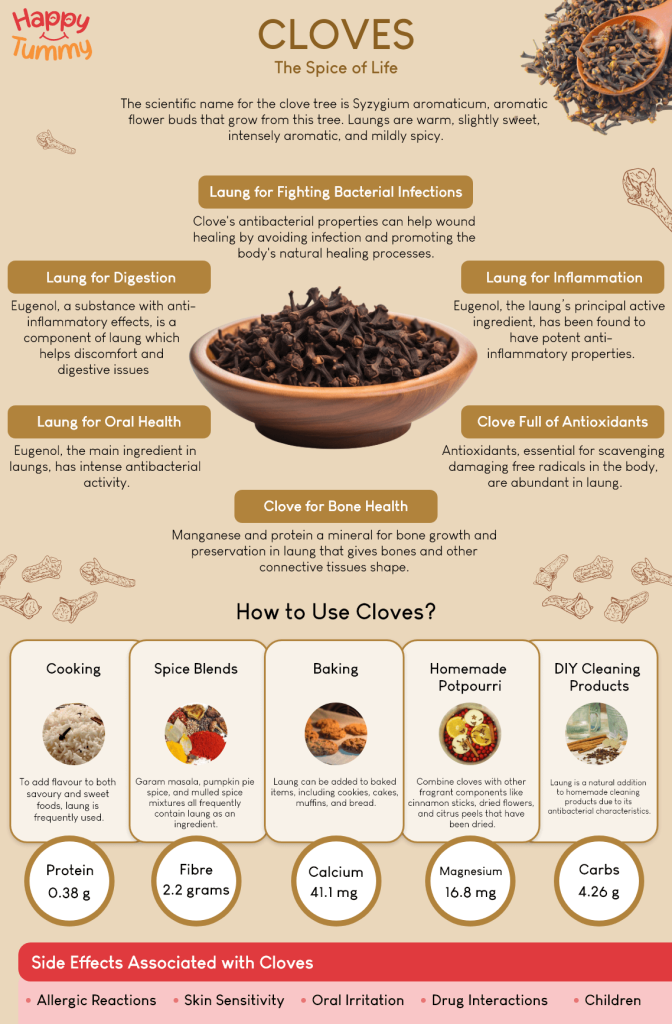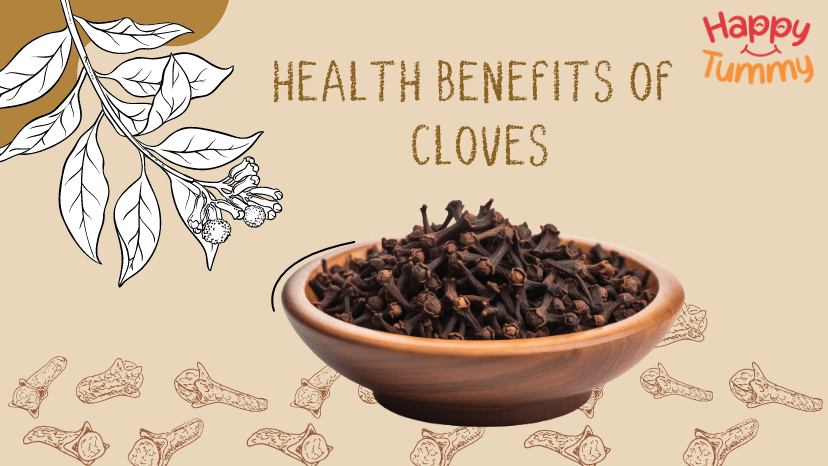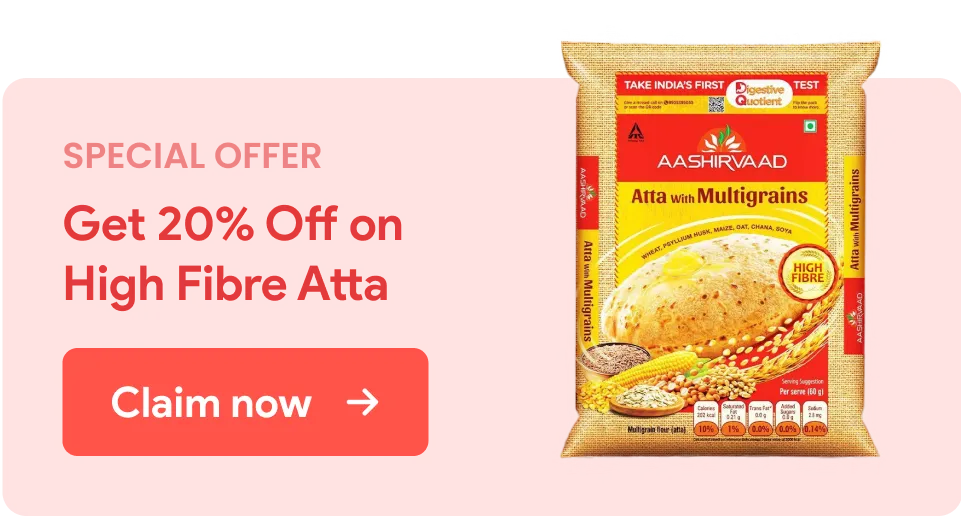Table of Contents
Hello there, spice lovers! Are you prepared to explore a world of flavour that is anything but boring? Spices are like the culinary world’s artists, contributing flavour, aroma, and excitement to every meal they touch.
From the cosy warmth of cinnamon to the zingy rush of black pepper, these little powerhouses have been elevating dishes for ages. But now, we will talk about a different spice called laung, or clove, which plays a unique role in our kitchens.
Imagine a spice that can quickly go from your warm cup of tea to the enticing depths of your favourite curry. A spice that is as adaptable as it is aromatic. Here we have the clove, a culinary delicacy that has found its way into kitchens, traditions, and cultures worldwide.
The clove symbolises a spice’s extraordinary influence on the culinary world because of its alluring aroma and unique flavour. Moreover, from the sweet to the savoury, the clove is here to add its irresistible touch, one meal at a time.
Let’s begin our journey and learn everything we need to know about cloves that can help us enhance our health.
What is Clove?
The scientific name for the clove tree is Syzygium aromaticum, aromatic flower buds that grow from this tree [1]. Due to their potent and distinctive flavour, these tiny, dried buds are frequently used as a spice in different cuisines. Do you know laung is native to the Maluku Islands in Indonesia?
Laungs are warm, slightly sweet, intensely aromatic, and mildly spicy. Frequently used in savoury and sweet foods, they provide recipes with depth and complexity. Also, they are a staple in many spice blends, such as garam masala and are commonly used whole or crushed. You can use them to enhance the flavour of baked items, soups, rice dishes, and meats.
Nutritional Profile of cloves
Laung is not just any spice that flavours the food and takes it to the next level; it is a treasure trove of many nutrients and compounds. Here is what one tablespoon or around 6 grams of laung will offer you [1]:
| Nutrients | Amount |
| Protein | 0.38 grams |
| Carbohydrates | 4.26 grams |
| Fibre | 2.2 grams |
| Calcium | 41.1 mg |
| Magnesium | 16.8 mg |
Clove (Laung) Benefits for Health

Due to its distinct chemical makeup, clove offers a variety of potential health advantages. Here are various health advantages connected to cloves, from their traditional uses in natural medicines to their contemporary applications:
1. Laung for Digestion
We have often been told to use home remedies for everyday health issues, which work wonders. One such is laung, which has repeatedly proven itself regarding many things, including digestion [2].
Eugenol, a substance with anti-inflammatory effects, is a component of laung. Discomfort and digestive issues can result from inflammation in the digestive tract. Your stomach will be happy tummy because of this anti-inflammatory property’s ability to lessen inflammation and encourage a healthier digestive system.
In addition, our bodies need the digestive enzymes amylase and lipase to break down fats and carbs. These can be produced more readily when you eat laung. Adequate enzyme synthesis is needed for our bodies’ effective digestion and nutrition absorption.
If you remember, indigestion, gas, and bloating have traditionally been treated with clove. It can ease discomfort and stop the production of too much gas by relaxing the smooth muscles in the digestive tract. Also, the smell and chemical composition of laung can soothe the stomach, reducing nausea and vomiting.
So, how can you use it to make your tummy a happy tummy? You can use whole cloves in cooking, make a cup of laung tea, or season food with powder for its digestive effects.
While you try some amazing recipes made of laung, you can check your digestion score by taking a small Digestive Quotient Test. It will tell you how well your digestive tract is working.
2. Clove Full of Antioxidants
Antioxidants, essential for scavenging damaging free radicals in the body, are abundant in laung [3]. Clove has one of the highest ORAC values among spices and herbs, indicating a significant amount of antioxidants.
Laung also contains antioxidants that can scavenge and neutralize free radicals, unstable chemicals that can harm cells and cause several ailments. By minimizing oxidative damage to cells and tissues, its antioxidants may help lower the chance of developing chronic diseases. It may benefit your general health and wellness.
And including laung is very simple in your diet. You can add whole cloves or clove powder to foods, drinks, and recipes to benefit from its antioxidant properties.
3. Laung for Fighting Bacterial Infections
You may already know this as Indians have used laung for ages to fight bacterial infections [4]. It is due to its inherent antibacterial qualities, well known for its potential to fight bacterial infections. Eugenol and other substances found in laung have strong antibacterial effects. It has been shown that many Gram-positive and Gram-negative bacteria are resistant to the antibacterial effects of eugenol.
Additionally, clove’s antibacterial properties can help wound healing by avoiding infection and promoting the body’s natural healing processes. Also, you can also use its oil on surfaces as a natural disinfectant when bacterial contamination is a concern.
4. Cloves for Oral Health
We are sure you would have had a toothache at some point in your life, and your parents or grandparents would have suggested you keep a laung in your mouth as a pain reliever [5]. But clove does more than just being a pain reliever. Let’s look at it.
Eugenol, the main ingredient in laungs, has intense antibacterial activity. Due to its antibacterial properties, gum disease, cavities, and bad breath are less likely to be developed. Using clove-based products such as toothpaste on a regular basis may help to promote healthier gums.
People have used clove oil for generations as a home treatment for toothaches. Its analgesic qualities can temporarily relieve discomfort and dental pain. Additionally, laungs’ anti-inflammatory characteristics can also aid in lessening gum inflammation, reducing painful and swollen gums.
Use clove oil diluted as a mouthwash or oral rinse to boost your oral hygiene. Its antimicrobial qualities can aid in getting rid of dangerous oral germs.
5. Clove for Bone Health
Now, this may come as a surprise for many since not many would link laung with healthy bones. Also, it is because we have always thought about milk as the prime source of healthy and strong bones. Read the below if you want to know how laung is also great.
Manganese, a mineral for bone growth and preservation, is in laung [6]. For the enzymes involved in bone metabolism, manganese serves as a cofactor. Even though clove is not a very good source of calcium, its components can help the body better absorb calcium from other dietary sources. And everyone knows how essential calcium is for strong bones.
Additionally, the chemicals found in cloves can help produce collagen, a protein that gives bones and other connective tissues shape. Collagen is essential for healthy bones and is required by the body. Additionally, its antioxidant and anti-inflammatory properties can support bone health maintenance as you age, reducing your risk of fractures and other bone-related issues.
6. Cloves for Inflammations
Eugenol, the laung’s principal active ingredient, has been found to have potent anti-inflammatory properties [7]. By preventing the synthesis of pro-inflammatory molecules, it can help to reduce inflammation at the cellular level.
Clove oil can be beneficial for various illnesses and aching muscles since it has analgesic properties that can ease the pain brought on by inflammation. The anti-inflammatory properties of laung may be beneficial for people with inflammatory joint diseases.
Side Effects Associated with Cloves
Laung provides several health advantages, but they may have undesirable effects if misused or in excess. Considerations and potential adverse effects related to laung are listed below:
- Allergic Reactions – Some people may be allergic to it or its components, which can cause allergic reactions such as skin rashes, itching, or breathing difficulties. If you suffer any allergy symptoms, stop it and get help from a doctor.
- Skin Sensitivity: Directly using undiluted clove oil on the skin may irritate or burn the skin. Before topical application, its oil must be diluted with another oil like coconut oil to avoid such situations.
- Oral Irritation: Clove oil can irritate, burn, or numb oral tissues when directly touching them. Also make sure to dilute clove oil properly and refrain from ingesting it when using it for dental health.
- Drug Interactions: There can be a few medications that can potentially interact with cloves and clove oil. Before using laung frequently, if you take medicine, speak with your doctor.
- Children: Due to potential adverse effects, its oil should not be applied to the gums of newborns or young children. Moreover, before using the oil on young children, consult a pediatrician.
How to Use Cloves?
There are many ways to use laung and add to your daily routine. Not only cooking it can be used in other ways as well as mentioned below:
- Cooking: To add flavour to both savoury and sweet foods, laung is frequently used. You can add whole or ground laung to curries, stews, soups, rice dishes, marinades, and sauces for a toasty and aromatic flavour.
- Spice Blends: Garam masala, pumpkin pie spice, and mulled spice mixtures all frequently contain laung as an ingredient. Your culinary masterpieces gain depth and complexity from these combinations.
- Baking: For a distinctive and aromatic twist, ground laung can be added to baked items, including cookies, cakes, muffins, and bread.
- Homemade Potpourri: To make your potpourri, combine cloves with other fragrant components like cinnamon sticks, dried flowers, and citrus peels that have been dried. Put the mixture in a bowl or sachet to freshen the air organically.
- DIY Cleaning Products: Laung is a natural addition to homemade cleaning products due to its antibacterial characteristics. To make a disinfectant spray, combine a few drops of its oil with water and other natural substances.
Final Thoughts
Cloves, the natural spice of life, is one of the few jewels shining brightly in culinary delights. We are reminded of nature’s unique ability to nourish and heal as we conclude about the numerous health advantages that laung provides. Laung has a long history of promoting health, as evidenced by both the ancient traditions that value them and the contemporary scientific understanding that support their value. Therefore, let us infuse our lives with cloves, which is that a well-lived life welcomes the blessings of nature and celebrates the holistic journey towards vitality and balance. It is time to infuse our foods with the rich aroma and flavour of laung for a healthy tomorrow.
FAQs
Many ingredients present in laung have been linked to anti-inflammatory properties. Eugenol is the most important of these substances. Eugenol has been known to reduce the body’s inflammatory response, which lowers the risk of various illnesses and promotes general health and wellness.
Laungs are thought to improve circulation, digestion, and metabolism and combat stomach issues, including gas, bloating, and nausea in Ayurveda. Clove essential oil is a component of oral hygiene products that help to maintain tooth health and freshen breath.
For oral and dental issues, laung oil is a highly efficient antimicrobial and pain reliever. Illnesses that are related to the gums can be treated with them. Although, it is recommended to consult your doctor before trying anything.
You could improve digestive health, prevent tooth decay, and lower it by chewing 1-2 cloves on an empty stomach daily.
By promoting enzyme secretion and increasing digestive motility, laung can help to enhance digestion. The best uses for cloves are to relieve nausea and gastric irritation.















